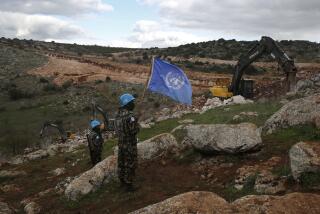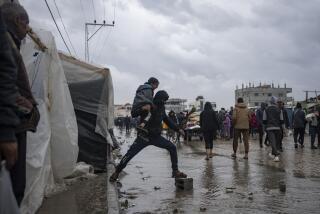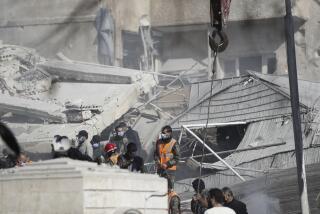U.N. calls emergency meeting on Syria chemical weapons charges
BEIRUT -- The United Nations Security Council called an emergency meeting in New York on Wednesday afternoon to discuss allegations of a deadly chemical weapons attack outside the Syrian capital, Damascus.
The announcement came amid mounting calls for a U.N. investigation into opposition charges that a poison-gas attack by the Syrian military killed hundreds of people early Wednesday across a broad swath of the city’s suburbs.
The allegations remained uncorroborated -- and Syrian authorities have labeled them a fabrication -- but the White House urged the U.N. to deploy an inspection team already on the ground in Syria to look into the matter.
Similar calls came from British Foreign Secretary William Hague and French President Francois Hollande.
“I call on the Syrian government to allow immediate access to the area for the U.N. team currently investigating previous allegations of chemical weapons use,” Hague said in a statement from London.
Representatives of the Arab League and the European Union also called for a U.N. inquiry.
But Russia, a close ally of Syrian President Bashar Assad, labeled the allegations of a new chemical attack a “premeditated provocation,” and cast doubt on the veracity of the opposition accounts. Syria has repeatedly denied any use of chemical agents in the more than two-year conflict.
Moscow has backed the Syrian government’s contention that it is anti-government rebels, not the military, who have previously deployed toxic gases. A Russian investigation indicated that rebels have produced chemical arms using a “cottage industry” approach, Moscow said. The Syrian opposition has denied possessing such weapons.
The U.S. and its allies previously said that evidence indicated the Syrian military had deployed small amounts of sarin, a nerve agent, on various occasions.
In a statement Wednesday, U.N. Secretary-General Ban Ki-moon expressed shock at the latest reports of use of chemical weapons.
“Mr. Ban reiterated that the use of chemical weapons by any side under any circumstances would violate international law, and reaffirmed the need for a ‘thorough investigation’ of the alleged incidents,” a U.N. spokesman told reporters in New York, according to the statement.
The Syrian government called the latest charges “untrue” and said the purported incident, which made headlines worldwide, was meant to cover up opposition losses on the ground and “distract” from the ongoing U.N. investigation.
Pro-government analysts said the allegations made no sense, because they come at a time when the Syrian military has seized the initiative on the battlefield and is cooperating with the ongoing U.N. investigation.
Expanding the U.N. inquiry to cover the latest incident would require approval of the Syrian government. Some kind of safe passage would have to be arranged for U.N. inspectors to enter what are heavily contested war zones on the outskirts of the Syrian capital.
“If the Syrian government has nothing to hide and is truly committed to an impartial and credible investigation of chemical weapons use in Syria, it will facilitate the U.N. team’s immediate and unfettered access to the site,” White House spokesman Josh Earnest said in a statement.
First, though, the U.N. would have to take some action to expand the role of the chemical weapons investigators currently in Syria. The 20-member team has said its mission is limited to looking into three previous alleged uses of chemical weapons in Syria. The U.N. inquiry is also narrowly tasked with determining whether such agents were used, not assigning blame to one side or the other.
The Syrian National Coalition, the U.S.-backed opposition group, alleged that more than 1,300 people were killed in chemical attacks Wednesday.
Among the areas allegedly targeted, according to the opposition, were the suburbs of Jobar, Zamalka and Ain Tarma in the so-called eastern Ghouta region, and Muadhamiya in the southwest. All of the areas are known as anti-government strongholds.
There were varying accounts, but opposition spokesmen generally said the agents were present in rockets that landed in the affected areas during an intense round of overnight government bombardments.
Syrian authorities have acknowledged carrying out a major offensive in some of the areas allegedly hit by poison gas, but the government said that only conventional weapons were used in the battle.
For months, the Syrian military has been engaged in a methodical offensive aimed at pushing insurgents away from Damascus and securing the capital from rebel mortar strikes and other attacks.
ALSO:
Ex-Pope Benedict on why he resigned: ‘God told me to’
Egyptian court orders Hosni Mubarak freed from prison
Japan may upgrade severity of Fukushima radioactive water leak
Staff writers Kathleen Hennessey in Washington and Alexandra Zavis in Los Angeles contributed to this report.
More to Read
Start your day right
Sign up for Essential California for news, features and recommendations from the L.A. Times and beyond in your inbox six days a week.
You may occasionally receive promotional content from the Los Angeles Times.






